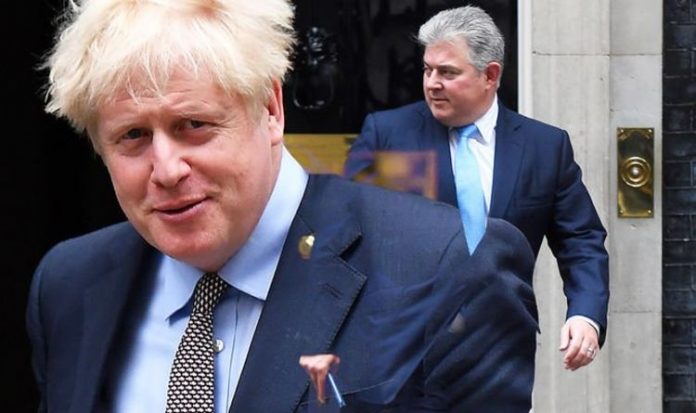The Prime Minister stirred up a wave of worry both inside and outside the EU when the UK published a bill on how it intended to manage trade at its borders after Brexit. The Internal Market Bill will enable ministers to overrule parts of the Northern Ireland Protocol — which is written into the withdrawal agreement — and alter the form of export declarations and other exit procedures if it is approved. However, Mr Johnson told Parliament the bill was “a legal safety net to protect our country against extreme or irrational interpretations” of the Northern Ireland protocol.
The protocol in question has riled unionists in Northern Ireland since it was introduced last year, as they fear it will isolate the country from the rest of the UK.
However, the EU and the UK wanted to ensure there was no hard border on the island of Ireland first and foremost.
The legislation meant Northern Ireland would still have to follow the rules of the EU’s single market and customs union, without being able to have any input into such rules and still officially leaving the bloc along with the rest of the UK at the end of this year.
A customs border will be drawn up down the Irish Sea instead.
The withdrawal agreement — and the protocol — then became international law when the UK left the bloc back in January.
So, by proposing the Internal Market Bill just as the eighth round of Brexit trade talks commence and months before the end of the transition period, the Government has triggered a storm of backlash.
Downing Street claimed it would only make “minor clarifications in extremely specific areas”.
However, Northern Ireland Secretary Brandon Lewis admitted, “yes, this does break international law”, although he added that it was only illegal in a “very specific and limited way”.
READ MORE: ‘Rushed’ NI Protocol jeopardises ‘UK future as independent nation’
Article 16 of the protocol reads: “If the application of this Protocol leads to serious economic, societal or environmental difficulties that are liable to persist, or to diversion of trade, the Union or the UK may unilaterally take appropriate safeguard measures.”
Northern Ireland has been concerned about “economic, societal or environmental difficulties” regarding the protocol for months.
The legislation also reads: “If a safeguard measure taken by the Union or the UK, as the case may be, in accordance with paragraph one creates an imbalance between the rights and obligations under this Protocol, the Union of the UK, as the case may be, may take such proportionate rebalancing measures as are strictly necessary to remedy the imbalance.
“Priority shall be given to such measures as will least disturb the functioning of this Protocol.”
However, it must be noted that the legislation does point out that “such safeguard measures shall be restricted with regard to their scope and duration to what is strictly necessary in order to remedy the situation”.
Ministers have defended the new legislation by saying it is needed in order to prevent “damaging” tariffs on goods moving from the UK to Northern Ireland.
The bill aims to stop any part of the UK from introducing regulations which could block the flow of goods from another part of the union, and allows the public to work freely across the UK without having to re-qualify.
The bill also prevents passing any secondary legislation from England or the devolved legislatures which undermine the principles.
Ministers would be able to apply state aid law according to the UK rather than the EU’s interpretation, too.
According to the Institute for Government, Downing Street wants to find an “exemption from exit summary declarations” which are required by the EU’s customs rules for goods moving from Northern Ireland to Britain through its new bill, and to remove the requirement “unilaterally” in the event of no deal.
However, the bill is still causing concern within the EU and could trigger the bloc to push for drastic action.
Law professor Catherine Barnard told the BBC: “There is a chance that the EU will decide to trigger the dispute resolution mechanism in the withdrawal agreement, which could lead to arbitration and a case before the European Court of Justice.”







